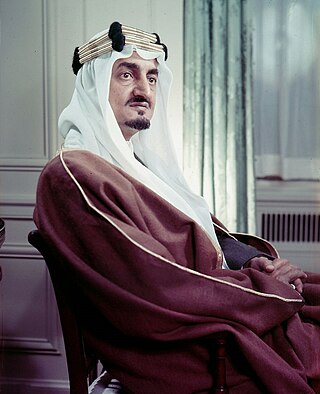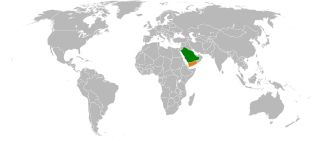
The history of Saudi Arabia as a nation state began with the emergence of the Al Saud dynasty in central Arabia in 1727 and the subsequent establishment of the Emirate of Diriyah. Pre-Islamic Arabia, the territory that constitutes modern Saudi Arabia, was the site of several ancient cultures and civilizations; the prehistory of Saudi Arabia shows some of the earliest traces of human activity in the world.

The Arabian Peninsula, or Arabia, is a peninsula in West Asia, situated northeast of Africa on the Arabian Plate. At 3,237,500 km2 (1,250,000 sq mi), comparable in size to India, the Arabian Peninsula is the largest peninsula in the world.

Faisal bin Abdulaziz Al Saud was King of Saudi Arabia from 2 November 1964 until his assassination in 1975. Before his ascension, he served as Crown Prince of Saudi Arabia from 9 November 1953 to 2 November 1964, and he was briefly regent to his half-brother King Saud in 1964. He was prime minister from 1954 to 1960 and from 1962 to 1975. Faisal was the third son of King Abdulaziz, the founder of modern Saudi Arabia.

The Cooperation Council for the Arab States of the Gulf, also known as the Gulf Cooperation Council, is a regional, intergovernmental, political, and economic union comprising Bahrain, Kuwait, Oman, Qatar, Saudi Arabia, and the United Arab Emirates. The council's main headquarters is located in Riyadh, the capital of Saudi Arabia. The Charter of the GCC was signed on 25 May 1981, formally establishing the institution.

Asir, officially the Asir Province, is a province in the southwest of Saudi Arabia, which is named after the ʿAsīr tribe. It has an area of 76,693 square kilometres (29,611 sq mi), and an estimated population of 2,024,285. ʿAsīr is surrounded by Mecca Province to the north and west, Al-Bahah Province to the northwest, Riyadh Province to the northeast, Najran Province to the southeast, and Jazan Province and the Yemeni Muhafazah (Governorate) of Saada to the south.

The North Yemen civil war, also known as the 26 September revolution, was a civil war fought in North Yemen from 1962 to 1970 between partisans of the Mutawakkilite Kingdom and supporters of the Yemen Arab Republic. The war began with a coup d'état carried out in 1962 by revolutionary republicans led by the army under the command of Abdullah as-Sallal. He dethroned the newly crowned King and Imam Muhammad al-Badr and declared Yemen a republic under his presidency. His government abolished slavery in Yemen. The Imam escaped to the Saudi Arabian border where he rallied popular support from northern Zaydi tribes to retake power, and the conflict rapidly escalated to a full-scale civil war.

Spialia doris, the Aden skipper or desert grizzled skipper, is a butterfly of the family Hesperiidae. It is found in Morocco, Egypt, Saudi Arabia, United Arab Emirates, Somalia and India. In the Atlas Mountains it is found at heights of 400 to 1,750 meters above sea-level.
The Arab Cold War was a political rivalry in the Arab world from the early 1950s to the late 1970s and a part of the wider Cold War. It is generally accepted that the beginning of the Arab Cold War is marked by the Egyptian Revolution of 1952, which led to Gamal Abdel Nasser becoming president of Egypt in 1956. Thereafter, newly formed Arab republics, inspired by revolutionary secular nationalism and Nasser's Egypt, engaged in political rivalries with conservative traditionalist Arab monarchies, influenced by Saudi Arabia. The Iranian Revolution of 1979, and the ascension of Ayatollah Ruhollah Khomeini as leader of Iran, is widely seen as the end of this period of internal conflicts and rivalry. A new era of Arab-Iranian tensions followed, overshadowing the bitterness of intra-Arab strife.

Myrina silenus, the common fig-tree blue, is a butterfly of the family Lycaenidae. It is found in Sub-Saharan Africa, southern Arabia and northern Oman.

Protogoniomorpha anacardii, the clouded mother-of-pearl, is a species of Nymphalidae butterfly found in tropical Africa, and in Arabia

The Yemeni Congregation for Reform, frequently called al-Islah, is a Yemeni Sunni Islamist movement established in 1990 by Abdullah ibn Husayn al-Ahmar, Ali Mohsen al-Ahmar, Abdul Majeed al-Zindani, with Ali Saleh's blessing. The first article of Islah basic law defines it as "a popular political organization that seeks reform of all aspects of life on the basis of Islamic principles and teachings".

Saudi Arabia and Yemen relations refers to the current and historical relationship between the neighbouring sovereign states of Saudi Arabia and Yemen. The two countries at one time did enjoy good relations and closely cooperated in military, economic and cultural issues. Now because of the ongoing Yemeni Civil War and the realignments of power in the Middle East with the emergence of al-Qaeda and the radicalization of some factions of Islam, Saudi Arabia has led a military intervention into Yemen.
Colotis daira, the black-marked orange tip, is a butterfly in the family Pieridae. It is found in the Nigeria, Sudan, Ethiopia, Somalia, Saudi Arabia, Yemen, Oman, Kenya and Tanzania. The habitat consists of dry savanna.
The modern history of Saudi Arabia begins with the declaration of the unification of Saudi Arabia in a single kingdom in 1932. This period of time in Saudi Arabia's history includes the discovery of oil in Saudi Arabia and many events. It goes on to encompass Saudi Arabia's brief involvement in World War II in 1945. Afterwards, it includes Saudi Arabia's involvement in the Western Bloc and the Cold War. It also includes Saudi Arabia's proxy conflict with Iran, the Arab Spring, and the ongoing Arab Winter.

The Yemeni civil war is an ongoing multilateral civil war that began in late 2014 mainly between the Rashad al-Alimi-led Presidential Leadership Council and the Mahdi al-Mashat-led Supreme Political Council, along with their supporters and allies. Both claim to constitute the official government of Yemen.

On 26 March 2015, Saudi Arabia, leading a coalition of nine countries from West Asia and North Africa, launched a military intervention in Yemen at the request of Yemeni president Abdrabbuh Mansur Hadi, who had been ousted from the capital, Sanaa, in September 2014 by Houthi insurgents during the Yemeni Civil War. Efforts by the United Nations to facilitate a power sharing arrangement under a new transitional government collapsed, leading to escalating conflict between government forces, Houthi rebels, and other armed groups, which culminated in Hadi fleeing to Saudi Arabia shortly before it began military operations in the country.

Iran and Saudi Arabia are engaged in a proxy conflict over influence in the Middle East and other regions of the Muslim world. The two countries have provided varying degrees of support to opposing sides in nearby conflicts, including the civil wars in Syria and Yemen; and disputes in Bahrain, Lebanon, Qatar, and Iraq. The struggle also extends to disputes or broader competition in other countries globally including in West, North and East Africa, South, Central, Southeast Asia, the Balkans, and the Caucasus.













